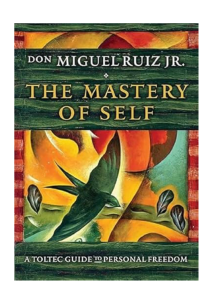From the simple sayings of “You are your worst enemy” to ancient strategic wisdom of the Art of War “知己知彼,百戰百勝 (If you know yourself and your enemies, you will have no fear in winning a hundred battles)”, there is no doubt that understanding and knowing yourself brings benefit.
Before I dive deeper into discussing this book, it is important to highlight that there are a huge amount of guides, quotes and literatures out there which provide various processes of self enlightenment. In my opinion, there is no perfect book when it comes to self-help literatures. To each of their own, every information provided in self-help needs to resonate with the reader themselves. As long as you keep an open mind and read everything with a pinch of salt, you might learn how to manage yourself better from this “The Mastery of Self” Toltec guide book written by Ruiz JR, Don Miguel.
If you are looking for books that discusses mental and spirituality management, please go ahead and have a look at this book. On the contrary, if you are looking for medical, neurological or psychological explanations on mental health topics please skip this book.
What is Toltec Guide?
As the titled, this is a guide from the Ruiz family based on Toltec methods. Before I came across this book, I had zero knowledge of any Toltec tradition. To simplify, Toltec people are an ancient group of Native Americans that came together in Mexico in the quest of perception studies.
The author explained that in Toltec tradition, the main function of the mind is “to dream or to perceive and to project information”. In order to manage your mind, you will metaphorically have interactions with different characters and traits. He described them in his Toltec key term chapter as: (1)Ally; (2)Attachment; (3)Authentic Self; (3)Awareness; (4)Domestication; (5)Dream of the Planet; (6)Narrators; (7)Parasite; (8)Personal Dream; (9)Toltec People; (10)and Toltec Warrior. If one skipped this chapter description, it will be difficult to digest the entire book.
Attachments of Many Forms.
Don Miguel Ruiz JR wrote 9 chapters of ways to master yourself in order to engage in the “Dream of the Planet”. In the first few chapters, he highlighted the importance of maintaining awareness in every choices one makes followed by concept explanations of domestication and attachments.
He described attachments as “ Taking something that is not part of you and making it a part of you through emotional or energetic investment”. Attachments come in many forms, it can be an object, an idea and even a person. The concept of humans being overly attached can manifest into a harmful obsession and caused unhealthy suffering.
It is interesting to read about Toltec guide’s view on attachment because in Buddhism, the concept of attachments were also mentioned as a source of suffering and unhappiness. Hence, it is clear that we should all take time to recognise our own attachments before it takes over our lives.
Parasite <vs> Mental Health.
I don’t think I need to mention how stressful and noisy the world can be these days. According to the book, the voice in your mind who acts as the narrator could be your ally or parasite in Toltec tradition. I was intrigued by the word “parasite” because it is a kind of mind voice that drains your energy and fogs your clarity with negative talk. Your mind can either feed the parasite, release it or turn it into an ally.
This chapter got me thinking, have we gotten more “parasites” in our mind these days compared to allies? I will leave that question to your own discretion. Keeping both your mental health balanced can be challenging and sometimes expensive. If you don’t know where to begin, you could start by spotting the “parasite” before it continues to latch on to you.
Transforming Parasite into Ally?
Ruiz JR wrote that it’s important to identify facts, use mindful words as well as examine opinions before accepting them as truths. This doesn’t mean that we should not welcome constructive criticism or opinions. In fact, I personally believe that being over-optimistic or self entitled is unhealthy. It is important to judge the voices in your mind before jumping to conclusions.
So how does one trains himself to do so? The author suggested “releasing judgements” by asking yourself these questions. For example:
- Is this judgement learned by yourself or from someone else?
- Can you recall when or from whom?
- How has this judgement shaped your actions?
- Have you experienced any failure or opportunities from this judgement risks?
After answering these questions, read your answers and ask yourself if you still want to let this judgement control your life? If your answer is no, you should write it down, read the statement out loud, release it and throw it into the trash. Please read up the actual book for further detailed description as the steps mentioned here are just a glimpse.
All in All
Topics such as: (1)Domestication; (2)Unconditional love; (3)Over coming resentment; (4)Forgiveness; (5)Attachments as well as; (6)Mastery of Self into action were mentioned in this book. Of course… I will not be able to cover all of the reviews for this post!
Before I go, I would like to add that I came across this book while scrolling through Amazon’s suggestion and out of curiosity I gave it a go. After finishing the chapters, I learned to listen to my inner voice differently and started squinting my eyes whenever I hear them talk.

– Mistytoad-